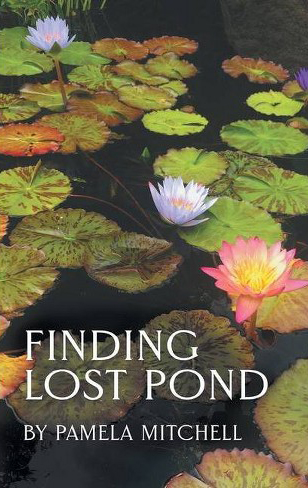‘Finding Lost Pond’ has strong vision and voice

Pamela A. Mitchell, as we learn from the jacket copy on her new book, “Finding Lost Pond,” “can often be found paddling her Hornbeck boat in the solace of mountain lakes.” Mitchell is an Adirondack native, so it’s no surprise that she likes canoes or even that she’d name her first poetry collection (from Finishing Line Press) after “Lost Pond boats used by / fur trappers.”
What holds my attention, though, is the consistent ecological and spiritual vision that Mitchell applies to her material. Her subject matter is the natural world, but through an aperture wide enough to take in human relationships and the work of healing.
Mitchell is a nurse by training and the first half of the book addresses her deeply physical work of making humans well. The specific scenarios — a suicide watch, her mother’s chemotherapy, the death of a coworker — are as vivid and immediate as her natural catalogs. When we meet Mitchell’s father, it’s not his dementia but his relationship with a hospital roommate that centers the poem. The two old veterans are holding hands and “squeezing… in gentle reminders back and forth / until no more squeezes.” Physical drama like this is common in Mitchell’s discerning work — things happen here, as well as ideas.
And despite the geographic title, Mitchell’s work doesn’t veer fully into natural observation until nearly halfway through, when her “hands become eyes creatures swim around me cool to the touch / blue-bloods / backs of scaly silver / within the silent swirling of grasses.” This poem (“Pain”) marks the collection’s transition toward natural observation.
There are more animals after this — whales, trout, mallards — and more trees. And yet, Mitchell’s sense for poignancy and significance is just as strong in this new sector as in the clinical. She presents self-sufficient scenes that don’t seek to answer or correlate with the earlier situations. Instead, the landscape embodies a sacred health for which the opening poems yearned. The title poem’s setting, for example, might be familiar to many — a small canoe suspended in a fascinating and lively ecosystem. She records the movements of herons and dragonflies, but she also notes how she’s “surrounded now by water lilies whose umbilical stems run deep into the dark violet water.” Mitchell takes her subject matter beyond flat observation, until the earth’s body is recognized as our shared body, and “the gates of heaven open.”
This sense of earthly sufficiency is strong in many of Mitchell’s later poems. The prayer-like piece “When I Leave My Body” evokes a naturalist’s cyclic observations while retaining a tinge of celestial ascent: “Let me rise above and savor riparian ways.” Or, in the haiku called “Heaven,” Mitchell writes, “Easter vigil candle light / beside me granddaughter / looks up smiling.” Hers is an earthly heaven, one that exists in the relationships and gestures of the here and now.
Several of the poems that Mitchell included in this volume have appeared in literary journals. All but one of those previously published pieces belong to the collection’s first half — the medical side — and many were published in clinical and healthcare outlets. Mitchell, then, has already established herself as a nurse who writes poetry. The joy of “Finding Lost Pond” is the fresh material, most of which leans into the observational, the specific, and the ecological. In this work we meet the writer as she takes the lessons and life experience of her nursing career into the new territory, “eye to eye,” with an exterior health and sanctity.
“Finding Lost Pond” is a book of strong vision and personal voice. It’s currently available at some local bookstores, as well as direct from Finishing Line Press.



